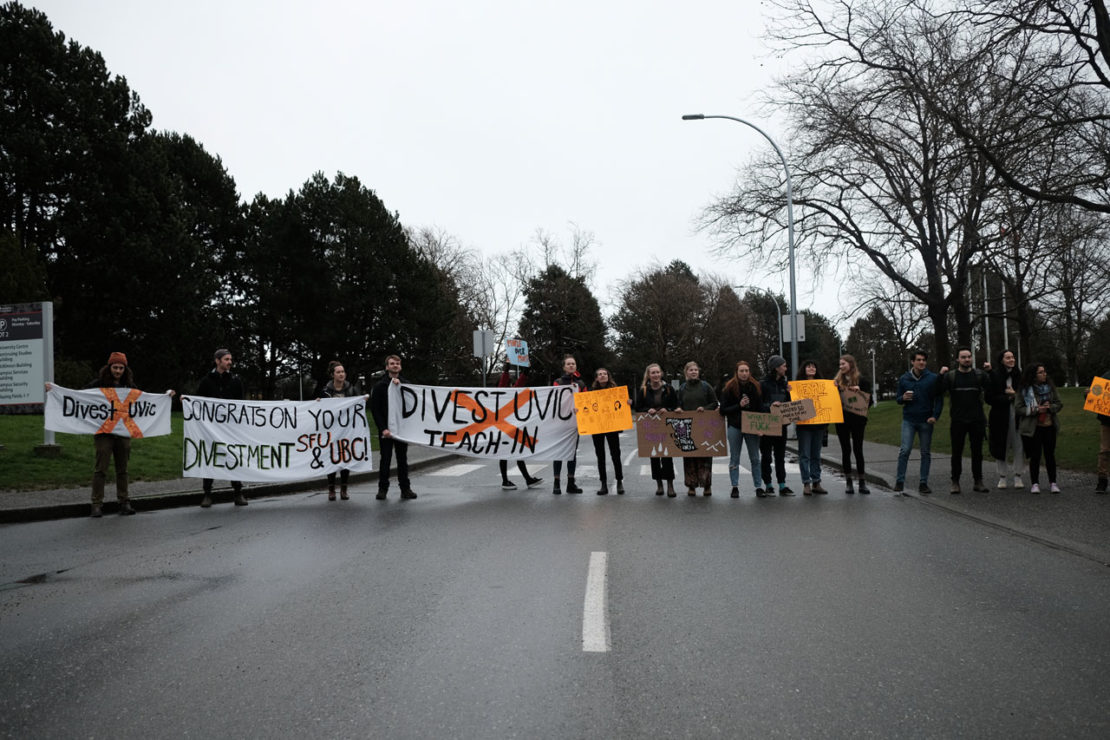Divest UVic spent years advocating for this huge win

UVic’s divestment of $80 million from the Working Capital Fund was a welcome surprise for many. One year into their ten-year responsible investment policy, the board of governors announced a sudden change of course to full divestment. But let’s be honest: should we really be surprised if an eight-year movement with over 70% support amongst faculty and students finally garnered some tangible changes in the university?
Divest UVic was founded in January of 2013. Over the years, the organization has held countless events and demonstrations in order to educate the university community to pressure the administration towards full divestment. This has included demonstrations like the protest at the Board of Governors meeting on Sept. 24, 2019, the blockade of the Michael Williams Building on Nov. 26, 2019, and the recent mural demonstration in November 2020.
Institutional memory for student organizations and student organizing is often fleeting, but here we want to acknowledge a few names that have worked hard to build Divest as a generational movement including student organizers Emily Theissen, Peter Gibbs, Nat Karpovskia, Malkom Boothyoyd, and Ida Jorgenson. Associate Professor James Rowe has been instrumental in mobilizing faculty.
Juliet Watts, Gillian Wiley, and Lena Price restarted Divest UVic in 2019. Jason Hemmerling, Elora Adamson, and Emily Lowan kept their momentum going. In the spring of 2019, a UVSS slate ran on a platform of divestment, was elected, and subsequently allotted a large portion of the UVSS’ campaigns budget to the cause. Of course, there were countless unnamed individuals that made small and large sacrifices out of their busy lives to advocate for divestment. We include these names not to recognize individual efforts, but to remind us all this is what happens when dedicated individuals come together to push for change.
To be clear, their work is far from over. Divest still estimates that the University of Victoria Foundation, a separate entity from UVic, has $40 million invested in fossil fuels.
Universities across the globe have been divesting from fossil fuels, which means that millions of dollars have been revoked from the industry that is suffocating our planet. In 2015, the Carbon Tracker Initiative released data that shows there are more than five times the amount of fossil fuel reserves needed to warm the planet more that the 2°C threshold have already been found.
The anxiety, pain, and anger we feel as capitalism exploits the earth and its resources is unmistakable. When grief surfaces surrounding environmental sustainability and decolonization, it is no small feat.
By removing investments in fossil fuel companies, a powerful message is being sent about the morality of fueling a climate catastrophe. UVic may not be close to getting a refund for inevitably rising sea levels, or increased risk of future pandemics, but the least they can do is stop funding corporations that are responsible for those crises.
It is also not coincidental that three months into Kevin Hall’s presidency, we see university financial practices start to align with UVic’s supposed values. With a new person at the helm, we may begin to see more substantial changes at the university. But students need to keep staying informed and remain engaged.
As the only independent news publication based out of UVic, we will continue to hold our institutions accountable. But we are just a newspaper. It is up to you, dear reader, to take the news and information we offer, find where you fit within these localized issues, have dialogues with your peers about them, and slowly but surely make waves at UVic.
Former UVic president David Turpin once said that a president’s role is successful if students have the freedom not to concern themselves with administrative issues.
We see the opposite: UVic presidents are successful precisely because of an engaged and receptive student body who are looking to play a part in shaping the future towards a better, more equitable world.







